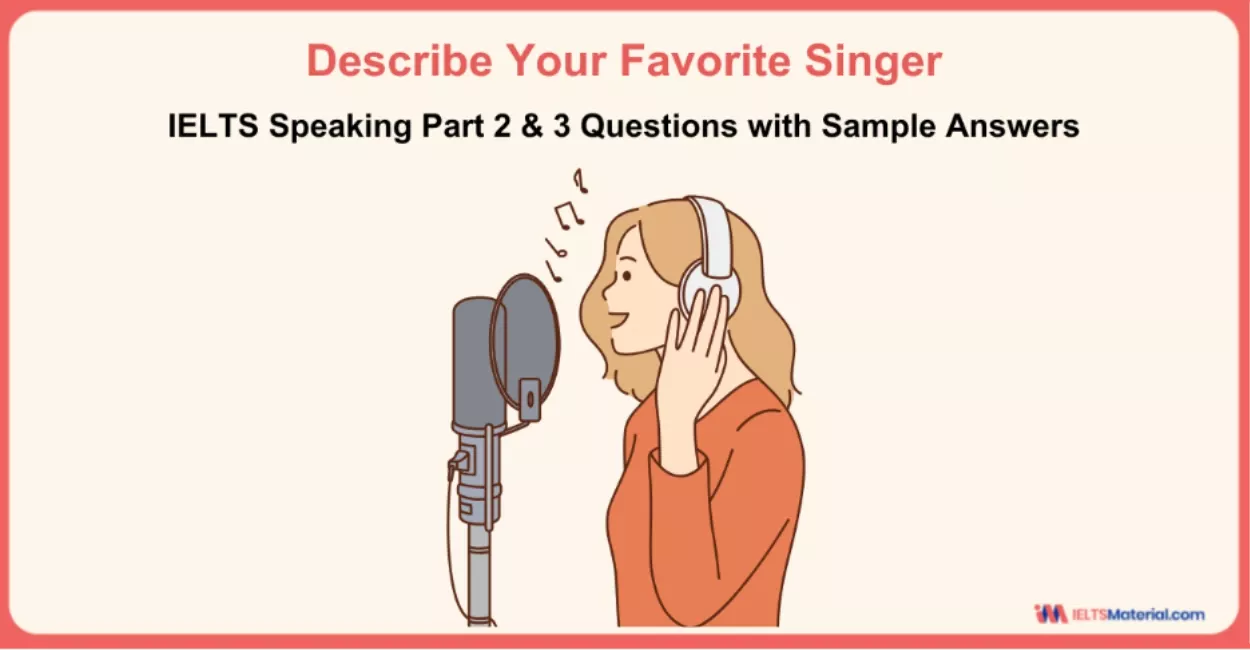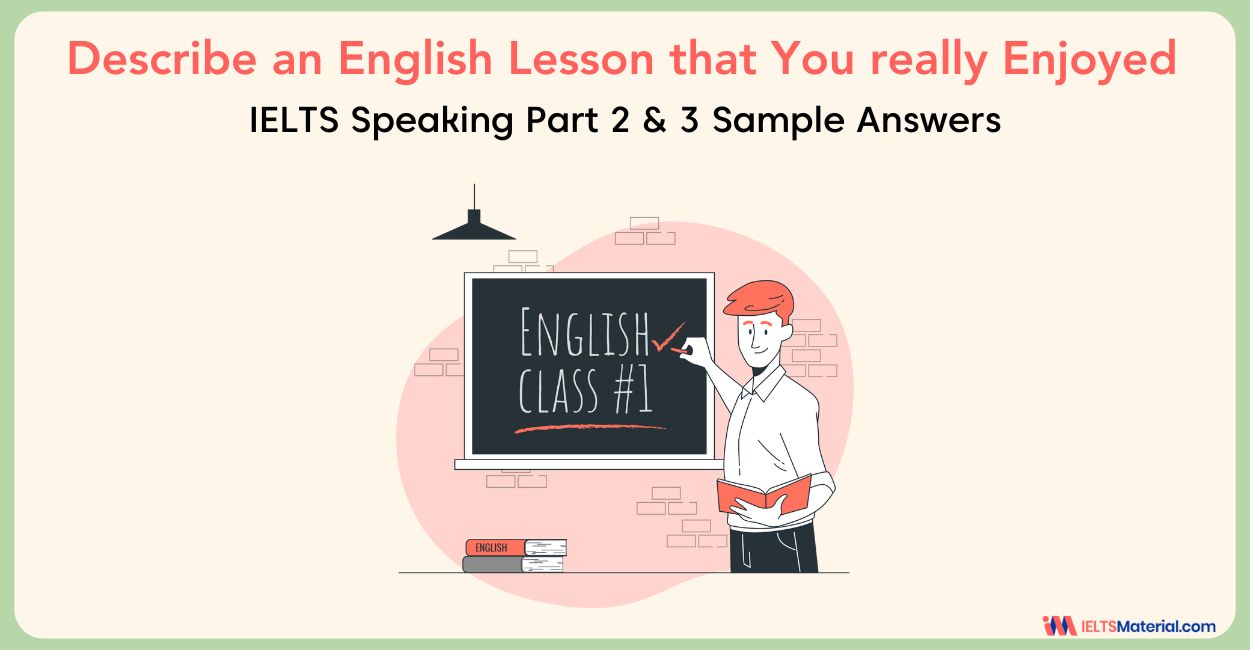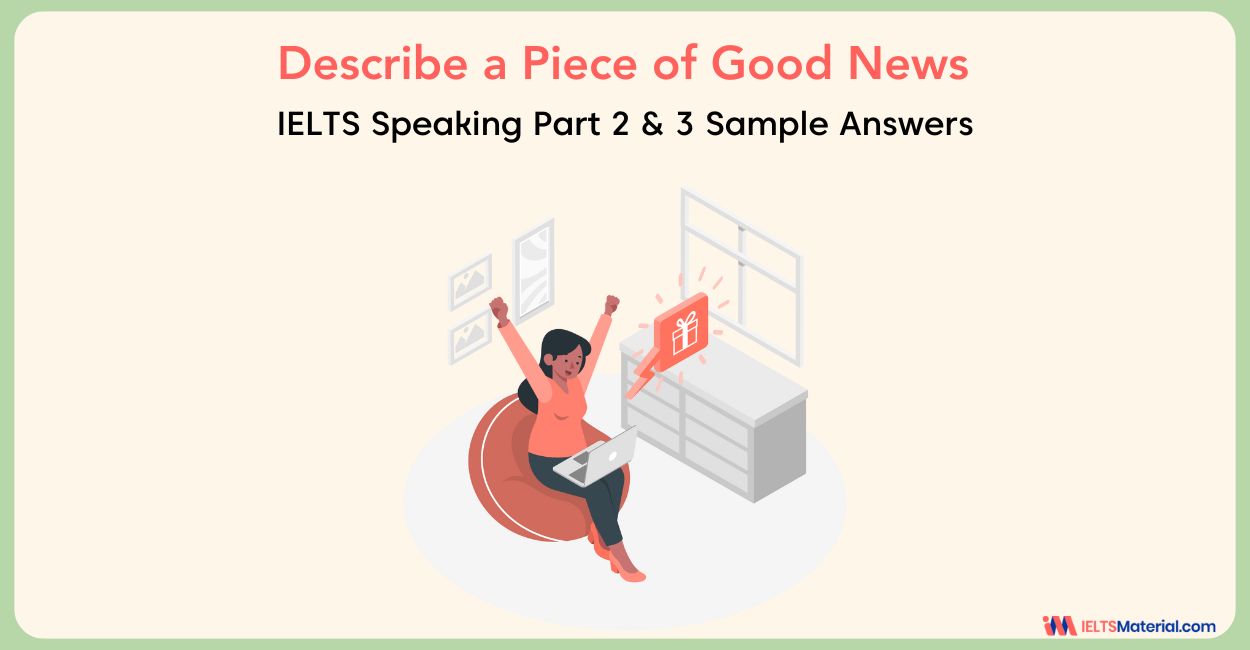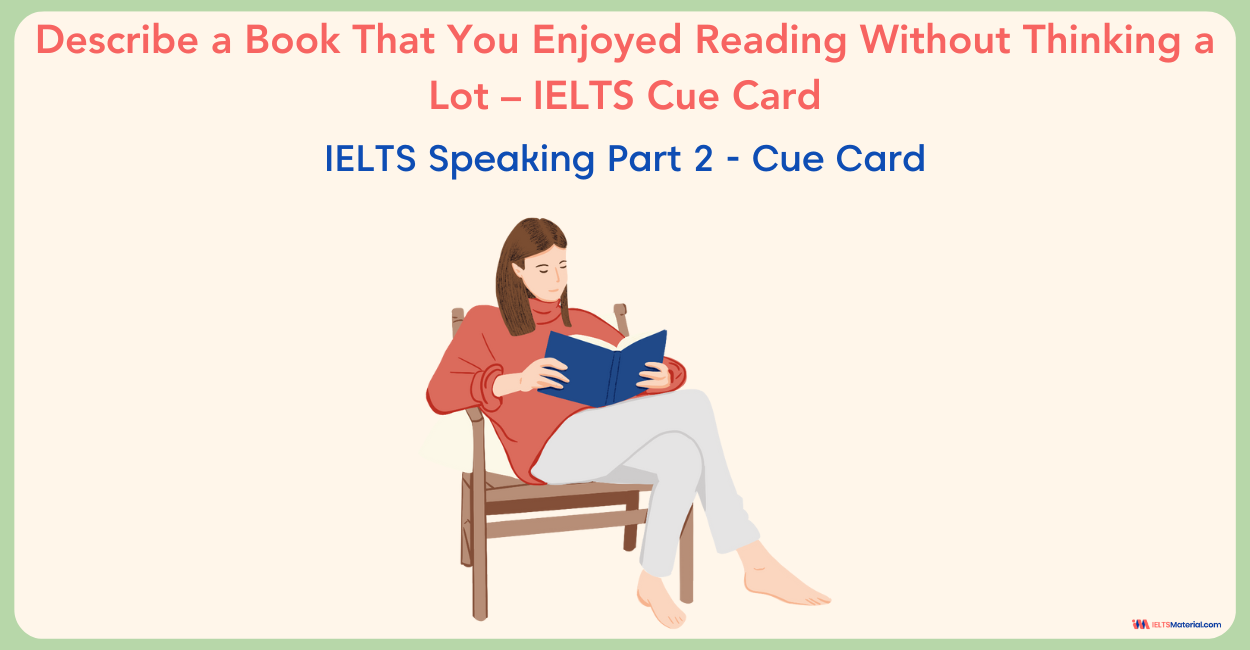Describe a Book that You Enjoyed Reading without Thinking a Lot – IELTS Cue Card
Get 3 sample answers for the IELTS Speaking cue card – "Describe a Book that You Enjoyed Reading without Thinking a Lot" prepared by our IELTS experts!
Table of Contents
- Describe a Book that You Enjoyed Reading without Thinking a Lot
- Describe a Book that You Enjoyed Reading without Thinking a Lot – Sample Answer 1
- Describe a Book that You Enjoyed Reading without Thinking a Lot – Sample Answer 2
- Describe a Book that You Enjoyed Reading without Thinking a Lot – Sample Answer 3
- Describe a Book that You Enjoyed Reading without Thinking a Lot – Speaking Part 3 Follow-Up Questions
- Describe a Book that You Enjoyed Reading without Thinking a Lot – IELTS Vocabulary

Limited-Time Offer : Access a FREE 10-Day IELTS Study Plan!
The IELTS Speaking Part 2, the cue card round, tests your ability to speak fluently for 1–2 minutes on a given topic. Many candidates find this section tricky due to the limited prep time and the need to organize thoughts quickly. To improve this skill, it’s essential to practice with real cue card questions, expand your vocabulary, and learn how to structure your responses effectively.
In this blog, we cover the topic “Describe a Book that You Enjoyed Reading without Thinking a Lot” – a commonly asked cue card question in IELTS Speaking Part 2. The blog includes a band 8+ sample answer, a list of useful IELTS Vocabulary (vocab), and tips to help you answer confidently and naturally in the actual test, to help you boost your overall IELTS band score.
Before you start, take a look at the useful idioms to answer IELTS Cue Cards!
Describe a Book that You Enjoyed Reading without Thinking a Lot
You should say:
- What was this book?
- Why did you decide to read it?
- What did reading this book make you think about?
- Explain why you enjoyed reading this book.
Describe a Book that You Enjoyed Reading without Thinking a Lot – Sample Answer 1
I’ve had the chance to read many books outside of my academic studies, and each one has been a learning experience. Some books brought joy, while others evoked sadness. But there’s one book in particular that made me think differently. It’s called “Unbroken: A World War II Story of Survival, Resilience, and Redemption” by Laura Hillenbrand.
I was drawn to this book because I wanted to uncover untold stories from the devastating war. This book tells the incredible story of Lieutenant Louis Zamperini, who faced extreme challenges after his American Air Force bomber crashed into the Pacific Ocean during World War II. The author vividly describes Zamperini’s epic struggle against nature, hunger, enemy aircraft, and more. After reading it, I was struck by the resilience of the human spirit displayed by Zamperini, who faced death head-on.
What I enjoyed most about the book was its detailed and vivid description of Zamperini’s experiences. It shed light on a lesser-known aspect of World War II, which historians had overlooked in the past. In my opinion, it’s one of the most inspirational war-related books I’ve ever read.
Sign up for our IELTS webinar & practice with experts to gain the skills for your target band score!
Describe a Book that You Enjoyed Reading without Thinking a Lot – Sample Answer 2
The book I enjoyed reading because it made me think a lot was “1984” by George Orwell. I decided to read “1984” because I had heard a lot about its thought-provoking themes and dystopian setting. Plus, it’s considered a classic, so I wanted to see what all the hype was about.
Reading “1984” made me think a lot about the power dynamics in society and the dangers of totalitarianism. It made me reflect on how governments can manipulate information and control people’s thoughts and actions. The book also raised questions about individuality, privacy, and the nature of truth.
I enjoyed reading “1984” because it challenged my perspective and made me question the world around me. It was fascinating to explore the ideas presented in the book and consider their relevance to our own society. Plus, Orwell’s writing style kept me engaged from start to finish. Overall, it was a thought-provoking and enlightening read that left a lasting impression on me.
Join our IELTS online classes to know about your weaknesses and work on them to achieve your desired band score!
Describe a Book that You Enjoyed Reading without Thinking a Lot – Sample Answer 3
The book that captured my interest and made me think deeply was “Sapiens: A Brief History of Humankind” by Yuval Noah Harari. I decided to read “Sapiens” because I wanted to gain a better understanding of human history and our place in the world. I had heard many positive reviews about the book and its exploration of various aspects of human evolution and society.
Reading “Sapiens” made me understand the origins of human civilization, the development of cultures and societies, and the impact of technology and ideology on our species. It also made me reflect on the complexities of human behavior, beliefs, and interactions throughout history.
I enjoyed reading “Sapiens” because it presented complex ideas in a clear and engaging manner. Harari’s storytelling ability and his ability to connect historical events to modern-day issues kept me hooked throughout the book. It challenged my existing beliefs and broadened my perspective on humanity’s past, present, and future. Overall, it was an enlightening read that encouraged me to think critically about the world around me!
Get Our Comprehensive IELTS Speaking Band 8 Preparation Course to achieve band score of 8+!
Describe a Book that You Enjoyed Reading without Thinking a Lot – Speaking Part 3 Follow-Up Questions
IELTS Speaking Part 3 dives deeper into your opinions and ability to express ideas clearly. Below are follow-up questions related to the cue card topic "Describe a Book that You Enjoyed Reading without Thinking a Lot" to help you prepare confidently.
1. Do you think it is important for children to read books? Why?
Yes, reading books is very important for children as it develops their language skills, expands their vocabulary and knowledge, stimulates their imagination, and promotes reading comprehension and critical thinking. It is an essential part of a child’s overall development and education.
2. What kinds of books do you think children like to read?
Children often enjoy storybooks like fairy tales, fables, adventure stories, myths, and fantasy books. Picture books with colorful illustrations also appeal to them. As they grow older, they tend to prefer chapter books, comic books, joke books, etc.
3. Do you think parents should spend money to buy books for their children?
Yes, buying books for children is a worthwhile investment as it supports their reading habits and interest in books. Reading develops a child’s mind and personality. Hence, parents should allocate a budget for age-appropriate books for their kids.
4. Do you think children should read electronic books, or is it better for them to read traditional printed books?
While e-books are more accessible and environment-friendly, printed books are better for children. Tactile stimulation of holding and flipping pages aids child development. Print books avoid screen fatigue. Most importantly, they promote parent-child bonding through reading together.
5. What kinds of books do you like to read?
I enjoy reading a diverse mix of fiction and non-fiction books on topics like philosophy, psychology, history, business, and spiritual growth. Some of my favorite fiction genres include mystery, thriller, and fantasy novels. I like books that make me think and offer new perspectives.
6. Do you think schools should encourage students to read books apart from textbooks?
Yes, schools must motivate students to read beyond textbooks for all-round development. Reading diverse books improves their reading and comprehension ability, analytical skills, and creativity. Schools can facilitate this by having well-stocked libraries, reading periods, book reviews/discussions, and recommended reading programs.
7. Do you think parents should read books to their children before they can read? Why?
Yes, parents reading aloud to children is extremely beneficial even before they learn to read themselves. It develops listening skills, and imagination and expands their vocabulary. It builds reading readiness, interest, and motivation to read. It promotes parent-child bonding. Reading routines must begin in infancy for maximum impact.
8. Do you think watching TV and playing computer games affects children’s reading habits in any way?
Yes, excessive TV and gaming do affect reading habits negatively. They eat into the time available for reading, make sustained concentration difficult, and shorten kids’ attention spans. Parents must regulate screen time and encourage reading as an alternate activity to develop good lifelong reading habits.
9. Do you think there are any differences between reading electronic books and reading traditional paper books?
While e-books provide convenience, portability, and instant access, paper books offer better comprehension, retention, and feel. Paper books do not cause eye strain or distractions. Flipping pages and annotations are easier. Most importantly, print books feel more real, which enhances the reading experience and enjoyment.
10. What do you think schools should do to encourage students to do more reading?
Schools should have well-equipped libraries, reading time in timetables, reading competitions, book clubs, meet-the-author events, recommended reading lists, reviews, and discussion forums. Appreciating extensive readers is important. The focus should be on reading for pleasure over academic reading only. Rewards, and recommendations by teachers also help.
Describe a Book that You Enjoyed Reading without Thinking a Lot – IELTS Vocabulary
Following are some of the IELTS Vocabulary found in the above sample answers of the topic: "Describe a Book that You Enjoyed Reading without Thinking a Lot - IELTS Cue Card".
- Comprehension – The ability to understand something.
- Tactile – Relating to the sense of touch.
- Stimulation – The action of arousing interest or excitement.
- Sustained – Continuing for an extended period without interruption.
- Concentration – The action or power of focusing all one’s attention.
- Retention – The ability to remember things.
- Annotation – Adding notes or comments to a text.
- Extensive – Covering a large area; having a great range.
- Academic – Relating to education and scholarship.
- Pleasure – A feeling of happiness, satisfaction and enjoyment.
For more Cue Cards, take a look at IELTS Speaking Part 2 | Topics, Questions and Samples Answers.
To achieve your desired IELTS Band Score, for the speaking exam, go through these Band 9 sample answers along with the vocabulary used, doing so will help you understand how to structure your responses naturally and confidently.
Useful Links:
- How to Prepare a Cue Card for IELTS Speaking
- What to Do if You Forget What to Say During IELTS Speaking Test?
- Latest IELTS Speaking Vocabulary to Boost Your Score
- How to Express Your Mixed Feelings in IELTS Writing & Speaking?
- 10 Useful Structures to Express Contrasting Ideas in IELTS Speaking & Writing Task 2
- 75+ Common English Words Used in IELTS Speaking Test
- 5 Silly Things You Say To Decrease Your IELTS Speaking Band Score
- Reasons for the IELTS examiner to interrupt you in IELTS Speaking

Start Preparing for IELTS: Get Your 10-Day Study Plan Today!
Recent Articles



Kasturika Samanta

Kasturika Samanta




Post your Comments